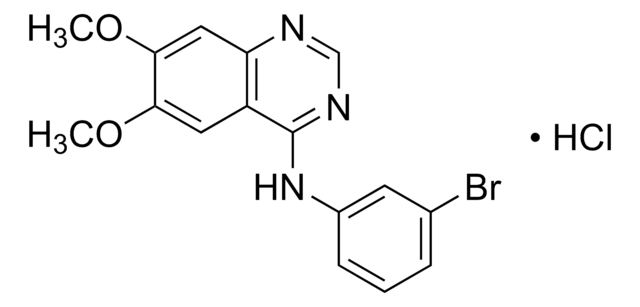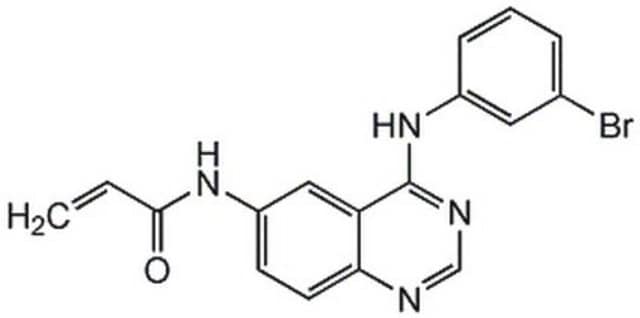658552
AG 1478
A cell-permeable, reversible, ATP-competitive, highly potent and selective inhibitor of epidermal growth factor receptor kinase versus HER2-neu and platelet-derived growth factor receptor kinase.
Synonym(s):
AG 1478, 4-(3-Chloroanilino)-6,7-dimethoxyquinazoline
About This Item
Recommended Products
Quality Level
Assay
≥98% (HPLC)
form
solid
manufacturer/tradename
Calbiochem®
storage condition
OK to freeze
protect from light
color
pale yellow
solubility
DMSO: 5 mg/mL
shipped in
ambient
storage temp.
−20°C
InChI
1S/C16H14ClN3O2/c1-21-14-7-12-13(8-15(14)22-2)18-9-19-16(12)20-11-5-3-4-10(17)6-11/h3-9H,1-2H3,(H,18,19,20)
InChI key
GFNNBHLJANVSQV-UHFFFAOYSA-N
General description
Biochem/physiol Actions
Epidermal growth factor receptor kinase
Warning
Preparation Note
Reconstitution
Other Notes
Liu, W., et al. 1999. J. Cell Sci.112, 2409.
Eguchi, S., et al. 1998. J. Biol. Chem. 273, 8890.
Levitzki, A., and Gazit, A. 1995. Science267, 1782.
Fry, D.W., et al. 1994. Science265, 1093.
Osherov, N., and Levitski, A. 1994. Eur. J. Biochem.225, 1047.
Ward, W.H., et al. 1994. Biochem. Pharmacol.48, 659.
Legal Information
Storage Class Code
11 - Combustible Solids
WGK
WGK 3
Certificates of Analysis (COA)
Search for Certificates of Analysis (COA) by entering the products Lot/Batch Number. Lot and Batch Numbers can be found on a product’s label following the words ‘Lot’ or ‘Batch’.
Already Own This Product?
Find documentation for the products that you have recently purchased in the Document Library.
Our team of scientists has experience in all areas of research including Life Science, Material Science, Chemical Synthesis, Chromatography, Analytical and many others.
Contact Technical Service








